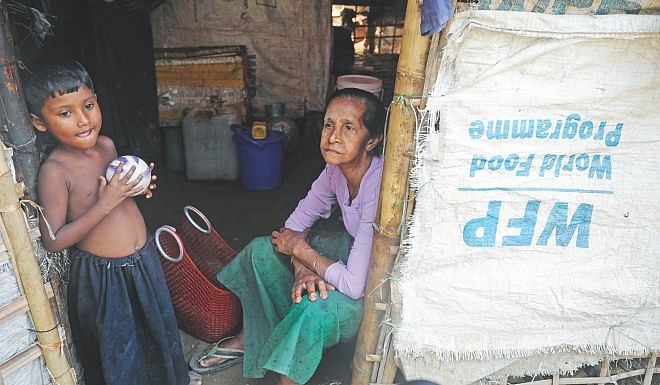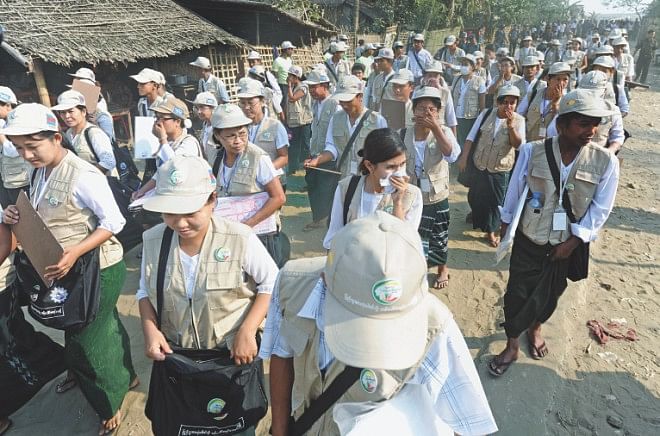Rohingyas told to register as 'Bengali'
Rohingyas told to register as 'Bengali'
Many of them vow to defy govt order as Myanmar begins key census

Myanmar yesterday embarked on a divisive census drive robbing the ethnic minority Rohingyas of their identity, which critics say would escalate the sectarian tensions in the former Junta-ruled nation.
Myanmar has announced that Muslims will be unable to register their ethnicity as "Rohingya" in a move aimed at mollifying angry Rakhine Buddhists who fear any official recognition for the stateless minority could herald a move towards political rights.
"If a household wants to identify themselves as 'Rohingya', we will not register it," government spokesman Ye Htut told reporters in Yangon on Saturday.
He said people could call themselves "Bengali", a term used by the authorities who view most Rohingya as illegal immigrants from neighbouring Bangladesh.
Groups of school teachers and local officials began the 12-day population survey -- the first since 1983 -- travelling from house to house in an ambitious drive aimed at counting everyone across the poverty-stricken nation.
But the census was called into question even before it started in Rakhine state, the site of deadly religious conflict.

Buddhist nationalists were seen travelling through state capital Sittwe yesterday, proclaiming by loud hailer that their planned boycott of the survey had been called off after they received written assurances that the term Rohingya was "illegal".
But Muslims in the bleak displacement camps on the outskirts of Sittwe, many made homeless in two waves of bloodshed in 2012, expressed determination to defy the government's edict to register as "Bengali".
"I was born here and my parents were also born here. I was born a Myanmar national. For me, I will not register as 'Bengali', I will register as 'Rohingya'," Hla Myint, 58, told AFP.
Humanitarian workers in the region have come under increasing pressure from Buddhist nationalists who accuse them of bias in favour of local Muslims.
Foreign aid workers fled Rakhine after Buddhist mobs attacked their offices as tensions escalated in the run-up to the census. The United Nations is pulling some 50 international and Myanmar staff from the region, while other major humanitarian groups are also removing their workers temporarily.
With tensions running high, the British Embassy in Yangon issued a statement registering its "concern" that the option on the census form for respondents "to self-identify... may not be met".
"It is important that the government put in place the conditions to allow everyone to participate in this nationwide census in a fair manner and free from intimidation," the statement added.
Backed by the United Nations Population Fund (UNFPA), the census is aimed at plugging an information deficit in the former military dictatorship.
Critics, who have called for the exercise to be postponed, accuse the organisers of focusing on the technical aspects of the survey and neglecting political concerns.
Myanmar is roughly the size of France with many people living in remote jungles and mountains with barely any infrastructure.
Minority groups make up some 30 percent of the estimated 55 to 60 million population.
This plurality has long been a source of conflict, with the former junta using the many civil conflicts that sprang up at the end of British colonial rule in 1948 as a pretext for their hardline rule.
Rakhine state isn't the only trouble spot for census takers. Several minority groups have expressed misgivings about the use of a controversial list of 135 official ethnicities in the census, fearing it could be used for political purposes.
UNFPA has run into criticism over the census. In February, the International Crisis Group, a Brussels-based non-profit organisation, warned that at this stage in Myanmar's transition from military rule, “a poorly timed census that enters into controversial areas of ethnicity and religion in an ill-conceived way will further complicate the situation.”
Critics said the UNFPA, as the main donor liaison to the Myanmar government, has focused too narrowly on technical issues and ignored the political dynamics. They argued that the census should be delayed, or the more controversial questions, like ethnicity and income level, removed.